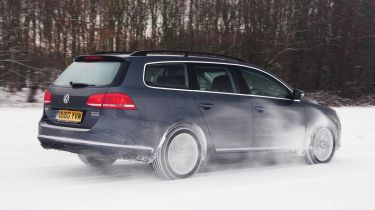Volkswagen Passat 2.0 TDI SE
It’s a nip and tuck to styling, but a revolution under skin for new car
The VW Passat has an unrivalled heritage in the family car class. The original debuted in 1973, and immediately forged a reputation for its solid build, reliability and fuss-free driving experience.
Over the years, the model has been subject to a process of careful evolution, and pushed upmarket.
This new, seventh-generation Passat promises to be the most desirable yet. Bosses claim the saloon and estate models have benefited from a host of tweaks designed to boost refinement, efficiency and quality. However, at a glance you could be forgiven for thinking it’s unchanged over the car it replaces.
According to VW, every panel on the Passat is new – with only the roof carried over from the previous model. But it takes an eagle eye to spot the changes. The nose gets the same treatment as the latest Polo and Golf flagships, while at the rear you’ll find revised tail-lamps.
Unsurprisingly, the designers have taken an equally cautious approach with the cabin, as the basic architecture and dashboard design are carried over largely unchanged. Look closely and you’ll spot the addition of an analogue clock above the stereo, while some of the switchgear has been revised. As you would expect from VW, the quality of the materials and build is first rate. The standard kit tally includes cruise control and Bluetooth, but parking sensors and climate control are options, adding up to £910 to the price –they’re included on the Skoda.
Used - available now

2022 Mercedes
GLC
35,992 milesAutomaticDiesel2.0L
Cash £27,300
2023 Peugeot
208
19,061 milesManualPetrol1.2L
Cash £14,752
2018 Volkswagen
Scirocco
70,657 milesManualPetrol1.4L
Cash £10,350
2021 Ford
Fiesta
23,384 milesManualPetrol1.0L
Cash £12,495While the VW doesn’t match the cavernous Superb for space, it still serves up a decent amount of room for the driver and passengers.
Swing open the tailgate of our estate test model, and you’re confronted by a well shaped 603-litre load bay; this trails the Skoda’s by 30 litres.
The 138bhp 2.0-litre diesel in the Passat is also 30bhp down on power, and couldn’t keep up at the track. Wintry conditions meant we were only able to complete in-gear acceleration tests – and the Superb showed the newcomer a clean pair of heels. On the road, the differences are even greater, and the VW needed to be worked hard to keep pace.
This is no hardship, as the car is the more refined choice. Improved sound insulation means any racket from the engine is kept to a minimum, while thicker window glass effectively cuts out wind noise. This relaxing nature is reinforced by the supple ride. The pay-off is less engaging handling than the Skoda. There’s plenty of grip and the steering is direct, but the driver gets very little feedback.
When it comes to running costs, the Passat has the edge.
All diesel versions come with VW’s BlueMotion Technology, which means lower CO2 emissions and the promise of better fuel returns. As a result, company and private buyers alike will have to hand over less in tax to the Treasury if they choose the new model.
The Passat improves on its predecessor in nearly every area, and matches the class leaders for refinement and comfort. Throw in the promise of lower bills, and it’s better than ever.
Details
Chart position: 2
WHY: Mild styling refresh hides a re-engineered Passat, which promises top refinement and efficiency.







